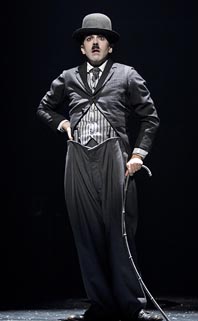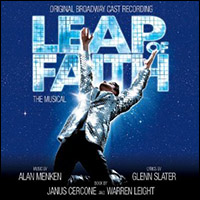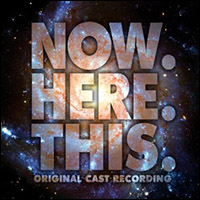
*
Our attention turns, for reasons that will become fast apparent, to the original cast albums of musicals we sat through — initially, in the theatre — thinking "I sure never want to hear this again." What pleasures and surprises do these recordings hold for us? How can there be pleasures and surprises in said recordings?
Let us first step back a few historical paces. Broadway has had far more misses than hits, as a result of which numerous unsuccessful musicals — from downright flops to disappointing failures — are represented in the original cast album archives. The mind immediately springs to the great Sondheim, two of whose musicals ignominiously folded within a fortnight. I, for one, have listened to the resulting original cast albums — the 1964 Anyone Can Whistle and the 1981 Merrily We Roll Along — far more frequently over the years than any number of longer-running, financially profitable, award-winning titles; say, La Cage aux Folles or Annie. That doesn't mean much of anything, except that cast albums of quick failures are not necessarily wipeouts.
There are numerous recordings that fall into this category, although not necessarily of the same distinction as the two Sondheim musicals above. Frank Loesser's Greenwillow, say, or Marc Blitzstein's Juno, Jerry Herman's Mack & Mabel, David Shire's Baby. And even David Yazbek's Women on the Verge of a Nervous Breakdown, which despite its lack of coherence in the theatre gets my vote for the richest Broadway CD of recent seasons.
There are also decidedly poor musicals that nevertheless left behind cast albums that entertain, like Oh! Captain!! or Donnybrook. For many years — back in pre-CD days — two of the hardest-to-find titles were the first-rate Greenwillow and the bottom-of-the-barrel Whoop-Up! If you want to hear a lousy musical, try Whoop-Up! I promise that like a salty potato chip, though, you will not be able to store it away after only one taste. It seems, alas, that they don't write bad musicals like they used to. Which brings us to where we started, examining three cast albums of shows that I had trouble sitting through patiently in the theatre.
Visit PlaybillStore.com to view theatre-related recordings for sale.
 |
||
| Rob McClure as Chaplin |
||
| Photo by Joan Marcus |
The rest of Chaplin, though, was well nigh unwatchable. And unlistenable. The score was generic and tinkly, with few moments of interest; the exception was something called the "Tramp Shuffle." Most of the showbiz songs sound like rejects from the thematically-related Mack & Mabel, one of the musically worthy flops referred to above.
Mention should be made of Christiane Noll, who as Charlie's mentally fragile mom is given songs that sound like rejects written for Nancy in Oliver!, and Jenn Colella as gossip columnist Hedda Hopper. Colella was given one of those big, wake-up-the-sleeping-crowd numbers called "All Fall Down." The song and the performer didn't win me over at the Barrymore, but it comes across better on CD. Even so, the only assets here aside from Mr. McClure are the orchestrations by Larry Hochman, which add freshness and life that the score lacks.
Visit PlaybillStore.com to view theatre-related recordings for sale.
 |
||
| Cover art |
Here we get a lot of revivalist-type, gospel-like songs that sound pretty much alike, mixed in with some musical comedy stuff. Raúl Esparza does what he can, but it's a thankless task. Jessica Phillips, Talon Ackerman and Leslie Odom, Jr. do well, too, but there's not much here for us to listen. The Leap of Faith CD is as difficult for listeners as the musical itself.
Visit PlaybillStore.com to view theatre-related recordings for sale.
 |
||
| Cover art |
With all those fans bloodied but unbowed — and waiting, impatiently, for more — Bowen & Bell returned to the Vineyard last spring with a companion piece, Now. Here. This. [Ghostlight]. The title itself indicates just what this turned out to be: an evening's worth of special material with italics around it, with the quartet of friends spouting overly-intellectualized personal tales and pronouncements. Some of the [title of show] fans saw this as a bonanza personally conceived for their high enjoyment. Many others, though, thought — enough!
The material sounds a bit better on the CD; for starters, it is 40-minutes shorter than the 100-minutes at the Vineyard. The annoyance factor is also reduced by the absence of all those projections of the cosmos. As with the former, Bowen remains a charming and friendly presence. Blackwell turned out to be the most impressive performer of the group, perhaps because she had the strongest material. (This time around, she was credited as co-author.)
From watching the two shows and listening to the two CDs, my hunch is that composer/lyricist Bowen has all the tools to entertain us. His music, here, is restrained by the need to add "colorful" and deprecating lyrics along the way; it is almost as if whenever his music starts to grow emotional, he slips in a joke to tell us that he is only kidding. This is in keeping with the style of the two musicals in question, yes; but I wonder what he would come up with if he was writing for characters who want to sing, and don't care about being funny.
(Steven Suskin is author of "Show Tunes," "The Sound of Broadway Music: A Book of Orchestrators and Orchestrations," "Second Act Trouble," the "Broadway Yearbook" series and the "Opening Night on Broadway" books. He also pens Playbill.com's Book Shelf and DVD Shelf columns. He can be reached at [email protected].) Visit PlaybillStore.com to view theatre-related recordings for sale.









